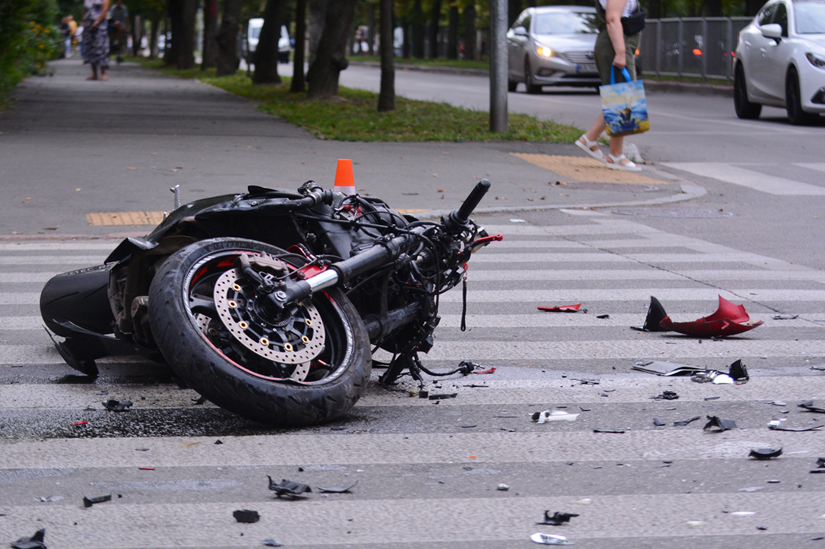Motorcycle Accident Law: What Every Rider Needs To Know
By Doug Standriff on August 15, 2025

Riding a motorcycle offers freedom and excitement, but it also comes with its own set of risks. Motorcyclists are more vulnerable on the road than other drivers, and accidents can result in serious injuries or even death.
Understanding motorcycle accident law is important for every rider, as it helps you stay safe and also protects your rights if an accident occurs. This article will explore key aspects of motorcycle accident law, including how it’s handled in New Jersey, insurance requirements, and what to do if you’re involved in a crash.
If you’re a motorcycle rider, knowing the ins and outs of the law can make all the difference in protecting your rights and recovering from an accident. Let’s find out what you need to know about motorcycle accident laws and how they affect you.
Common Causes of Motorcycle Accidents
Understanding the causes of motorcycle accidents can help you avoid risky situations and stay safe on the road. Some of the most common causes include distracted driving, speeding, failure to yield, and road hazards. In some cases, drivers fail to see motorcyclists, especially when changing lanes or at intersections.
In addition to driver error, poor road conditions such as potholes, slick surfaces, or inadequate signage can contribute to accidents. Inclement weather, such as rain or fog, also increases the risk of motorcycle crashes. As a rider, it’s important to be aware of these risks and take the necessary precautions to reduce your chances of being involved in an accident.
Understanding Motorcycle Accident Law
In this section, we will break down the most important aspects of motorcycle accident law that every rider should understand.
Determining Fault
The first step in a motorcycle accident lawsuit is identifying who was at fault, as this will directly impact the compensation you can receive. Fault can be assigned to:
- Another Driver: The most common scenario is where a car or truck driver causes an accident by failing to yield, making an improper lane change, or driving recklessly.
- The Motorcyclist: In some cases, the motorcyclist may be found partially or fully at fault, particularly if they were speeding, running a red light, or not following road laws.
- Third Parties: Fault may also lie with a third party, such as a municipality responsible for poorly maintained roads, which contributed to the accident.
Identifying the person(s) fault will determine whether you’re eligible for compensation and how much you might receive.
Types of Compensation Victims Can Seek
Motorcycle accident law allows victims to seek a variety of compensatory damages after a crash. Compensation can be categorized into two main types: economic and non-economic.
Economic damages are tangible losses that can be calculated directly, such as medical expenses, lost wages, and the cost of repairing or replacing your motorcycle. In the case of severe injury, lost earning capacity over the course of your career can also be factored in.
Non-economic damages are more difficult to quantify but are equally important in recognizing the impact of the accident on the rider and their family. If a motorcycle accident results from gross negligence or malicious behavior, punitive damages may also be awarded. These are intended to punish the wrongdoer and deter similar behavior in the future.
How New Jersey Motorcycle Accident Laws Apply
In New Jersey, the law surrounding motorcycle accidents is governed by the state’s motor vehicle statutes, with a particular focus on negligence and whether any traffic laws were violated. New Jersey is a comparative negligence state, meaning that if you, as the motorcyclist, are partially at fault, your compensation may be reduced based on your level of responsibility in the accident.
NJ motorcycle accident laws specifically consider the unique vulnerabilities of motorcyclists. Unlike drivers of cars, motorcyclists have minimal physical protection, making them more prone to severe injuries even in low-impact accidents. This factor is taken into account when evaluating the severity of the crash and determining appropriate compensation.
In cases where another driver is at fault, the law often evaluates whether that driver violated any specific traffic laws (e.g., failing to yield to a motorcyclist in a designated lane or turning in front of the bike). The more severe the violation, the more likely it is that the motorcyclist will be entitled to higher compensation.
The Role of a Motorcycle Accident Lawyer
Navigating motorcycle accident law can be complicated, especially when dealing with insurance companies, determining liability, and filing lawsuits. But with Bergen County’s best motorcycle accident lawyers, you can get the guidance you need.
Our professional motorcycle accident attorney from Bergen Law will make sure that you are not taken advantage of during a vulnerable time. We are here to ascertain that you get fair compensation for both economic and non-economic damages resulting from your accident.
Protect Yourself and Your Rights
Understanding motorcycle accident laws is an important way to prepare for an accident, should one occur. Being informed is a great way to protect yourself and your rights.
If you’ve been involved in a motorcycle accident, reach out to Bergen Law. Our team of experienced lawyers will help you navigate the complexities of NJ motorcycle accident laws. Contact us today for a free consultation, and get the answers and legal support you need.
